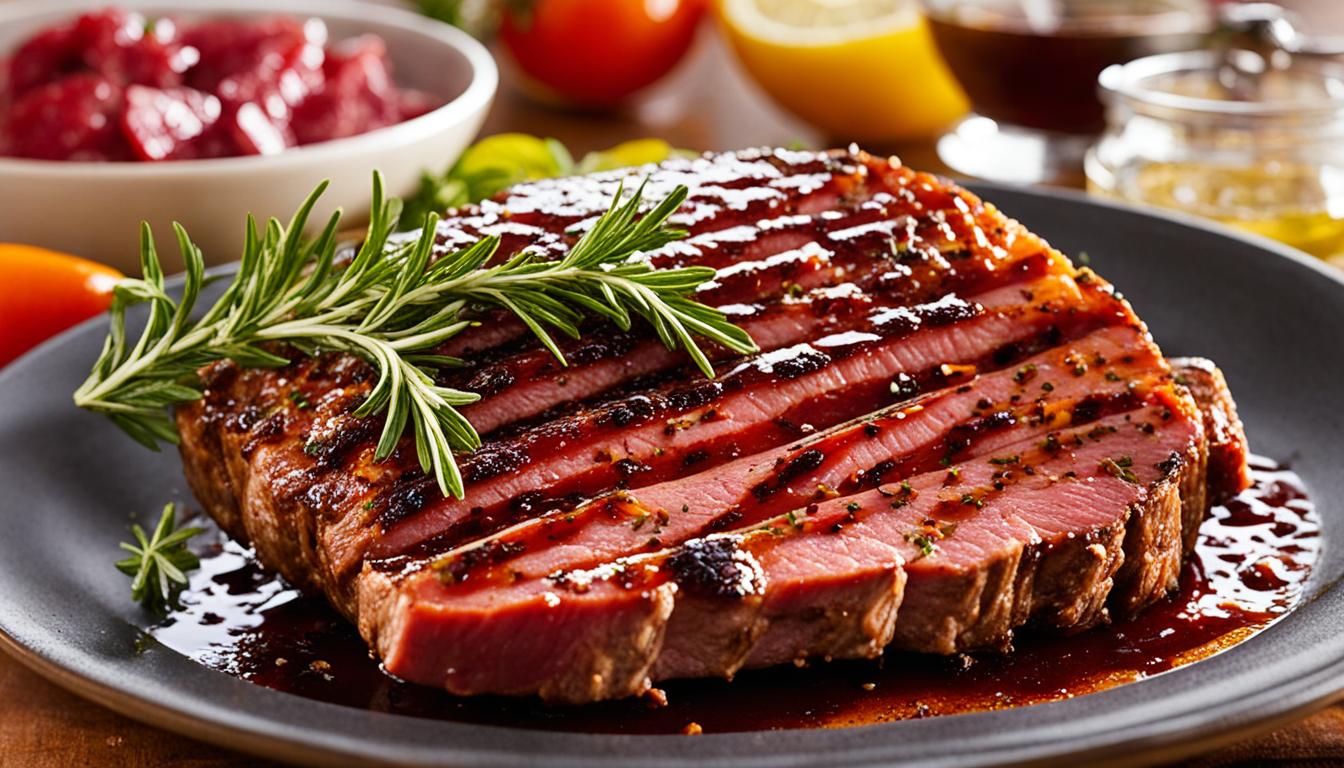Have you ever wondered if marinating meat makes a significant difference in taste and tenderness? Is it worth the effort and time to marinate your favorite cuts of beef, chicken, lamb, or pork? We’re here to unveil the secrets of marination and explore the benefits, techniques, and best practices for marinating meat. So, should you marinate meat? Let’s find out.
Marinating meat has long been considered a culinary tradition to enhance the flavor and tenderness of various meats. But does marinating really make a difference? Can it transform an ordinary dish into an extraordinary one?
Join us as we dive deep into the world of marinating and discover the reasons behind marination’s popularity. We’ll explore the science behind marination, uncover common myths, and share valuable tips and techniques to help you marinate meat like a pro. Whether you’re a seasoned grill master or a cooking enthusiast looking to elevate your culinary skills, this marinating guide is a must-read.
So, get ready to unlock the secrets behind marinating meat and take your dishes to new heights of flavor and tenderness. Let’s dive into the world of marinades, techniques, and marination times for different meats. Your taste buds will thank you!
Myths About Marinating Meat
When it comes to marinating meat, there are several common misconceptions that need to be debunked. Let’s take a look at some of the most prevalent myths regarding meat marination and separate fact from fiction.
Myth 1: The longer you marinate meat, the more flavorful it will be
Contrary to popular belief, research shows that marinades primarily penetrate the surface of the meat and do not significantly impact the interior. While longer marination times can impart some additional flavor, the difference is minimal. This is especially true for larger cuts of meat. However, marinating smaller or more delicate pieces of meat, as well as vegetables, can yield better results in terms of flavor absorption.
Myth 2: Marinades tenderize tough cuts of meat
While marinades can slightly soften the surface of the meat, they have limited effectiveness in tenderizing tough cuts. The best way to tenderize tough meat is to use proper cooking techniques, such as using a meat tenderizer or cooking the meat sous vide. These methods physically break down the tough fibers in the meat, resulting in a more tender texture.
Myth 3: Store-bought salad dressings can be used as marinades
Using store-bought salad dressings as marinades is a common misconception. While they can add some flavor to the meat, they often lack the complexity and depth of homemade marinades. Additionally, they may contain additives and preservatives that can affect the taste and texture of the final dish. It’s best to stick to homemade marinades made with fresh ingredients for the best results.
To achieve the best results when marinating meat, it’s important to understand the basic mechanics of marination and the limitations of marinades. While they can enhance flavor on the surface of the meat, they won’t radically change the interior texture or tenderness. By debunking these common marinating myths, you can approach marination with a clearer understanding and make the most out of your marinated meat dishes.
Tips for Effective Meat Marination
When it comes to marinating meat, following a few tips and best practices can make all the difference in creating a mouthwatering and tender dish. To start, it’s essential to use a combination of oil and acid, such as vinegar or citrus juice, as the base of your marinade. The oil not only carries the flavors but also helps conduct heat, while the acid adds tanginess and tenderizes the meat’s surface.
For a well-balanced flavor, consider including a touch of sweetness by adding sugar or other sweeteners to your marinade. Additionally, don’t forget about the importance of salt. Not only does it draw out moisture from the meat, but it also enhances the overall taste.
Customizing the flavor profile of your marinade is another key aspect. Experiment with a variety of herbs, spices, and aromatics to achieve your desired taste. However, to prevent bacteria growth, it’s crucial to refrigerate the marinating meat. The marination time will vary depending on the thickness and type of meat, but generally, a few hours is sufficient for flavor infusion. For a more intense flavor, you can opt for longer marination or even try vacuum-sealing for better results.
Remember to discard any leftover marinade that has come into contact with raw meat to avoid cross-contamination. Lastly, it’s important to note that marinades primarily affect the surface of the meat. So, understanding proper cooking techniques is vital in achieving delicious results. By following these tips and best practices, you can unlock the full potential of marinating meat and create flavorful, tender dishes that will impress your taste buds and guests.
